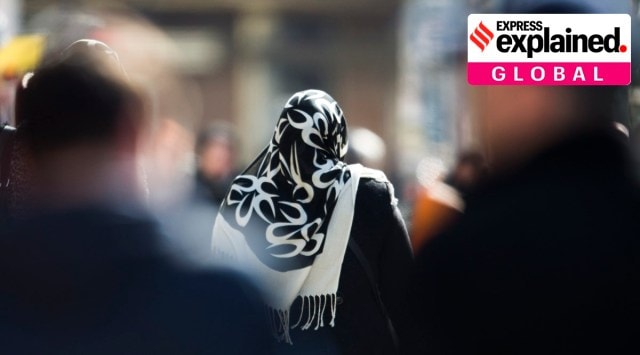Explained: Why the EU’s top court has permitted employers to ban headscarves at work
The headscarf has been at the centre of controversy and debate in Europe for years. In several countries, courts have been able to impose restrictions on donning religious symbols or garb in the workplace as well as in public spaces.
 A woman with a headscarf, a traditional dress for Islamic women, walks on a street at the district Neukoelln in Berlin. (AP Photo: Markus Schreiber, File)
A woman with a headscarf, a traditional dress for Islamic women, walks on a street at the district Neukoelln in Berlin. (AP Photo: Markus Schreiber, File)Last week, the European Union’s highest court reaffirmed that companies in Europe can forbid women from wearing headscarves to work — a ruling that led to widespread condemnation from human rights activists and Muslim nations for appeasing Islamophobia.
“The decision by the European Court of Justice on headscarf in the workplace is another blow to the rights of Muslim women with headscarf, and will play right into the hands of those warmongers against Islam in Europe,” Turkish President Recep Tayyip Erdogan’s spokesman Ibrahim Kalin tweeted on Sunday.
The Luxembourg-based European Court of Justice (ECJ) ruling was not limited to headscarves alone. It applies to all visible symbols of religious and political belief. The court said the bloc’s 27 member states will have to justify whether there is a “genuine need” on the part of the employer to ban these religious markers.
Newsletter | Click to get the day’s best explainers in your inbox
What led to the latest ruling by the European Court of Justice?
The ruling was based on separate cases brought to the court by two German Muslim women who were suspended from their jobs for wearing hijabs. Both women — one of whom worked at a childcare centre in Hamburg, while the other was a cashier at a pharmacy — were not wearing headscarves when they started working for their respective employers. They adopted hijabs after coming back from parental leave.
According to court documents, both women were told that donning the headscarf was not permitted. The childcare centre employee was suspended twice after she refused to take off her headscarf, while the pharmacy worker was transferred to a less visible post, where she did not have to interact with customers as much.
The EU’s highest court has today again upheld the right of employers to sack Muslim women from their jobs for wearing the headscarf if justified by notion of “neutrality”. The ECJ also seems to admit that this is a form of discrimination ????? pic.twitter.com/mMwYdJoHwr
— Mehreen (@MehreenKhn) July 15, 2021
The court said company policies barring workers from wearing “visible form of expression of political, philosophical or religious beliefs in the workplace” did not qualify as direct discrimination as long as the same rules applied to religious symbols and garb across faiths.
In both cases, the German courts will finally have to decide whether the women have been discriminated against.
Significantly, over five million Muslims live in Germany, making them the largest religious minority in the country. But the headscarf debate in Europe far predates the ECJ’s latest ruling. A number of cases just like these two have been heard, a majority of which were filed by applicants for positions as teachers at public schools and judges at courts.
The court laid down that employers need to show a “genuine need” for the ban — this could be the “legitimate wishes” of the customers, or to present a “neutral image towards customers or to prevent social disputes”.
“However, that justification must correspond to a genuine need on the part of the employer and, in reconciling the rights and interests at issue, the national courts may take into account the specific context of their Member State and, in particular, more favourable national provisions on the protection of freedom of religion,” the court said.
What was the ECJ’s previous stance on headscarves?
The headscarf has been at the centre of controversy and debate in Europe for years. In fact, the ECJ’s latest ruling is based on a similar decision it made in 2017. Then, the EU court had said that companies may ban staff from wearing any visible religious symbols, including headscarves, under specific conditions. At the time, too, the ruling sparked a huge outcry among activists and the Muslim world.
The debate around headscarves in Europe
Over the years, across Europe, many courts have been able to impose restrictions on donning religious symbols or garb in the workplace as well as public spaces such as parks. France, for instance, prohibited the wearing of hijabs in state schools in 2004. Then, in 2014, the country’s top court upheld the dismissal of a Muslim daycare worker for wearing a headscarf at a private school where religious neutrality was demanded from all of its employees.
More recently, the French senate’s controversial ‘anti-separatism’ bill sparked widespread protests, with critics denouncing it for singling out the Muslim community. As part of its proposed initiatives to help promote secularism, the senate seeks to impose a ban on girls under 18 wearing the hijab in public. The hashtag #HandsOffMyHijab was shared widely on social media for several weeks.
 Countries such as Belgium, Austria and the Netherlands have also passed laws that ban full face-covering veils in public places. However, the hijab — which covers just the shoulders and head — is not included in these bans. But Austria’s constitutional court notably ruled that a law which banned girls under the age of 10 from wearing headscarves in schools was discriminatory.
Countries such as Belgium, Austria and the Netherlands have also passed laws that ban full face-covering veils in public places. However, the hijab — which covers just the shoulders and head — is not included in these bans. But Austria’s constitutional court notably ruled that a law which banned girls under the age of 10 from wearing headscarves in schools was discriminatory.
In 2016, German Chancellor Angela Merkel said the wearing of full-face veils should be prohibited “wherever it is legally possible”.
How have countries reacted to the headscarf ban?
Among the loudest voices opposing the ECJ’s ruling are Turkey’s cabinet ministers. It prompted President Erdogan’s spokesperson Ibrahim Kalin to ask on Twitter, “Does the concept of religious freedom now exclude Muslims?”
In an article condemning the court’s ruling, international NGO Human Rights Watch pointed out that the argument rested on the flawed notion that “a client’s objections to employees wearing religious dress can legitimately trump employees’ rights.”
- 01
- 02
- 03
- 04
- 05





































